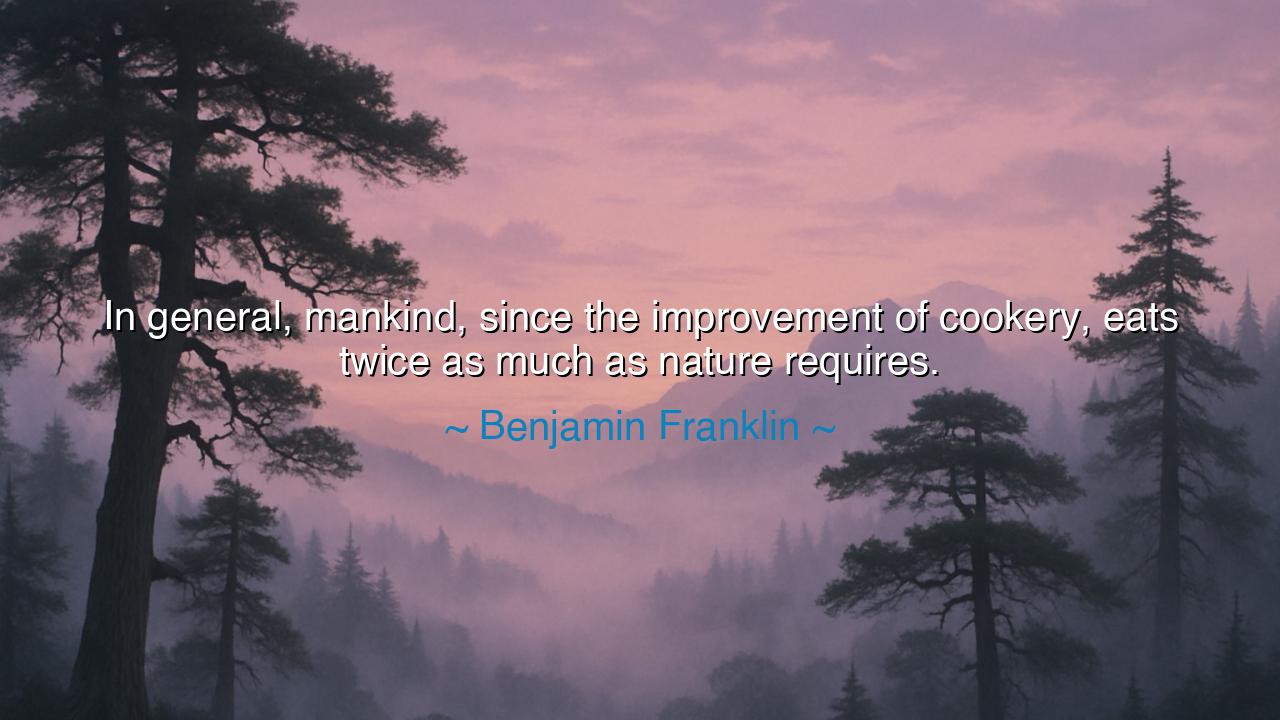
In general, mankind, since the improvement of cookery, eats twice
In general, mankind, since the improvement of cookery, eats twice as much as nature requires.






"In general, mankind, since the improvement of cookery, eats twice as much as nature requires." These words, spoken by the wise Benjamin Franklin, carry within them a profound reflection on human nature. Cookery, in its most refined form, is not simply the art of preparing food—it is a force that has reshaped how we relate to our own bodies and desires. Franklin's observation suggests that, in the pursuit of more flavors, more variety, and more indulgence, humanity has strayed from its natural balance, consuming not out of necessity, but out of pleasure and excess. This excess, he suggests, is not just a physical phenomenon but a moral one—a sign of a society that has lost sight of the simple, natural rhythms of life.
In the ancient world, the philosophers and stoics understood the importance of moderation. Epictetus, the Stoic sage, taught that the key to true freedom was not in indulging our every desire but in mastering them. He warned that those who constantly seek to gratify their senses would never find true peace, for pleasure is fleeting and ever-hungry. Similarly, Aristotle, in his pursuit of the golden mean, spoke of balance in all things, including the sustenance we consume. According to him, excess is as dangerous as deficiency, and a life of harmony comes from understanding what is truly necessary for the body and soul. Franklin, too, understood this timeless truth: when we begin to eat more than what is required, we not only damage our bodies but also our spirits, for we succumb to excess and forget the simple joys of life.
Consider the ancient Greeks, who prized moderation in all aspects of life. The food they ate was simple, fresh, and meant to nourish the body without overwhelming it. The Athenians were known for their careful attention to their health, not through indulgence but through a balance of exercise, rest, and simple, nutritious meals. They did not see eating as a luxury or an indulgence, but as a necessary part of maintaining balance in their lives. Franklin's words echo this ancient wisdom, reminding us that the improvement of cookery—with its endless opportunities for variety and richness—has led us away from the humble simplicity of what our bodies truly need. In our desire for pleasure, we have forgotten the essential truth: that nature requires only enough to sustain us, not to overindulge.
In more modern times, we see the same excesses that Franklin warned of. The rise of fast food, with its cheap, convenient, and overly indulgent offerings, has led to a world where the abundance of food is taken for granted, and the need for true nourishment is often ignored. Take, for example, the story of Marie Antoinette, the Queen of France, whose extravagant lifestyle became a symbol of the excesses that led to her downfall. Her indulgence in luxury—from elaborate feasts to an overabundance of riches—was seen as a sign of the disconnection between the ruling class and the needs of the people. It was not just her eating habits but her complete disregard for moderation that contributed to the growing discontent in France. Like Franklin, the moral lesson here is that when we are led by indulgence and excess, we lose sight of what is truly important, and the consequences can be profound.
Similarly, the health crisis in many parts of the world today is a direct result of the same overindulgence Franklin observed. In a society where food is no longer simply nourishment but a source of entertainment and status, people often consume more than what the body needs. The obesity epidemic in the modern world mirrors Franklin’s warning: we have come to see eating as a means to satisfy desires, not a means to fulfill the natural needs of the body. And in doing so, we pay the price with our health and well-being. The excess of food leads not to greater joy, but to greater suffering, just as Franklin predicted.
The lesson of Franklin's words is a timeless one. It speaks to the importance of moderation and balance in every aspect of life. We are not meant to overindulge in the pleasures of the body, for excess leads to both physical and spiritual ruin. Just as the ancient philosophers urged their followers to practice self-control, so too must we recognize that the improvement of cookery, while bringing us pleasure, can also lead us away from the natural balance that the body requires. To live in harmony with nature, we must learn to eat not for indulgence, but for sustenance—to nourish our bodies without overwhelming them.
So, dear listener, take this wisdom to heart. Seek not to indulge in excess, but to live with balance and awareness. When you sit at the table, ask yourself: What does my body truly need? Let the answer guide you toward a life of health, peace, and contentment. Like the ancient Greeks and the wise Franklin, embrace the beauty of moderation. Do not seek to satisfy every craving, but to feed your body with the right amount of nourishment, allowing your spirit to remain clear, strong, and true. In this, you will find not only well-being but a deeper understanding of the simplicity and joy of life.






AAdministratorAdministrator
Welcome, honored guests. Please leave a comment, we will respond soon